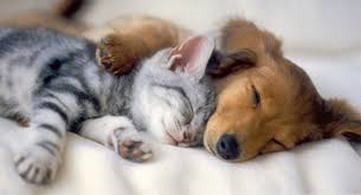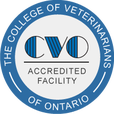Why Should I Neuter My Pet?
We know that your pet is very important to you. A companion, a friend, and in a real sense a member of your family. In order to reduce the number of animals ending up in shelters, and to help keep your own pet healthy, you are encouraged to neuter your male dog or cat.
When should my pet be neutered?
Since most male dogs and cats are ready and willing to reproduce by the time they are six to nine months of age, we recommend that your pet undergo the neuter procedure when they are 6 months old. Pets that are not neutered are able to breed consistently throughout the year or whenever they are exposed to a receptive female.
What benefits are there to neutering my pet?
Both male dogs and cats are prone to wander in search of romance and often times will find themselves exposed to fighting with another animal or dangers such as cars. In addition, male cats are well-known to mark their territories by spraying odorous urine on furniture, walls, shrubs...etc. Male dogs are sometimes equally anxious to mark their territories.
While many owners decide to neuter their pet due to behavioral challenges, there are many solid health reasons for neutering your pet. Having your pet neutered greatly reduces the incidence of prostate and testicular disease which can rob your pet of precious years later in life.
What changes can I expect in my pets behavior after the surgery?
Many owners are concerned that neutering their pet will result in weight gain and laziness. There is no evidence that shows that this has to be the case. It is true that once your pet has been neutered they will have fewer caloric needs, so a reduction in the amount of food fed per day should be done. Behaviorally, many pets will become less dominant and aggressive with other male animals and their urge to mark their territory will be reduced.
Will the surgery be painful for my pet?
Our skilled veterinary team takes every precaution to minimize the pain of surgery. We use the latest techniques and products in a proactive approach that includes administering pain medication before, during and after surgery. Pre-surgical pain medication helps to reduce post-surgical inflammation and complications, allowing patients to rest, recover and return to normal activities as soon as possible.
The Importance Of Pre-surgical Bloodwork
For all surgical patients we run a pre-anesthetic panel to help minimize the risks of the anesthetic to your pet. While most healthy animals are at minimal risk for complications during an elective surgery such as a neuter or spay, there is always the chance that an animal might have an underlying problem that might not manifest itself until the animal is put under anesthesia. Surgery is not a good time to discover that there is a problem. We will not take risks with your pet. Knowing that major organ function is within normal limits helps us plan for a smooth surgery and quick recovery.
The pre-surgical blood work analyzes your pets complete blood cell count and evaluates the functioning of major organs such as the liver and the kidneys.
If you wish to book an appointment, or if you have any other questions or concerns, please feel free to contact our office at 905-532-0043.
Sincerely DSAH, Keeping your pets healthy!
When should my pet be neutered?
Since most male dogs and cats are ready and willing to reproduce by the time they are six to nine months of age, we recommend that your pet undergo the neuter procedure when they are 6 months old. Pets that are not neutered are able to breed consistently throughout the year or whenever they are exposed to a receptive female.
What benefits are there to neutering my pet?
Both male dogs and cats are prone to wander in search of romance and often times will find themselves exposed to fighting with another animal or dangers such as cars. In addition, male cats are well-known to mark their territories by spraying odorous urine on furniture, walls, shrubs...etc. Male dogs are sometimes equally anxious to mark their territories.
While many owners decide to neuter their pet due to behavioral challenges, there are many solid health reasons for neutering your pet. Having your pet neutered greatly reduces the incidence of prostate and testicular disease which can rob your pet of precious years later in life.
What changes can I expect in my pets behavior after the surgery?
Many owners are concerned that neutering their pet will result in weight gain and laziness. There is no evidence that shows that this has to be the case. It is true that once your pet has been neutered they will have fewer caloric needs, so a reduction in the amount of food fed per day should be done. Behaviorally, many pets will become less dominant and aggressive with other male animals and their urge to mark their territory will be reduced.
Will the surgery be painful for my pet?
Our skilled veterinary team takes every precaution to minimize the pain of surgery. We use the latest techniques and products in a proactive approach that includes administering pain medication before, during and after surgery. Pre-surgical pain medication helps to reduce post-surgical inflammation and complications, allowing patients to rest, recover and return to normal activities as soon as possible.
The Importance Of Pre-surgical Bloodwork
For all surgical patients we run a pre-anesthetic panel to help minimize the risks of the anesthetic to your pet. While most healthy animals are at minimal risk for complications during an elective surgery such as a neuter or spay, there is always the chance that an animal might have an underlying problem that might not manifest itself until the animal is put under anesthesia. Surgery is not a good time to discover that there is a problem. We will not take risks with your pet. Knowing that major organ function is within normal limits helps us plan for a smooth surgery and quick recovery.
The pre-surgical blood work analyzes your pets complete blood cell count and evaluates the functioning of major organs such as the liver and the kidneys.
If you wish to book an appointment, or if you have any other questions or concerns, please feel free to contact our office at 905-532-0043.
Sincerely DSAH, Keeping your pets healthy!






